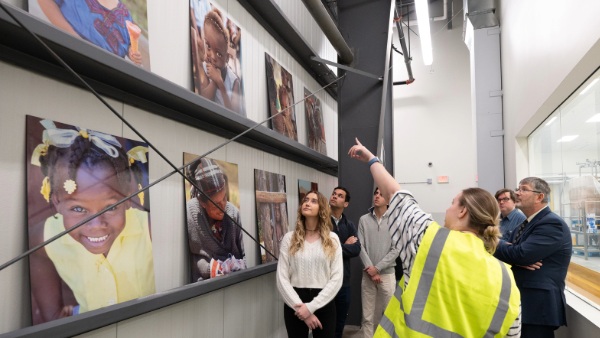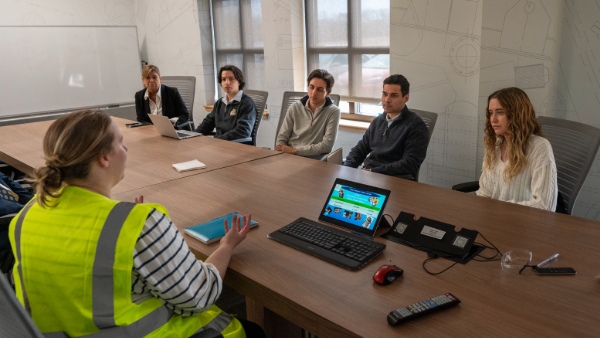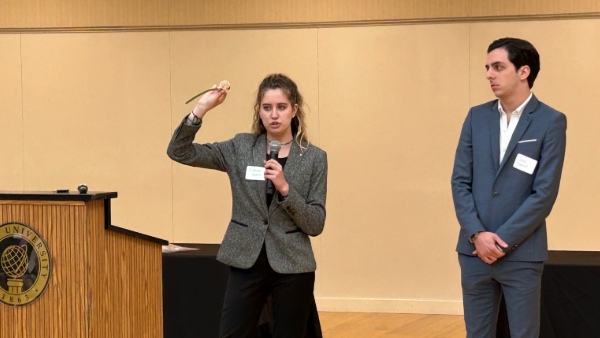As Bryant seniors Emerson Swartz, Jose Espinal, Alexander Valente, and Eduardo Peralta tour the North Kingstown headquarters of Edesia Nutrition, the weight of their assignment is never out of mind — or out of view.
Hung throughout the facility are giant portraits of children who overcame malnutrition with the aid of Edesia’s products. The photos bring home the directive that Professor of Operations and Supply Chain Management Chris Roethlein, Ph.D., P’15, P’24, founder and director of the Global Supply Chain Management practicum, shared during the student team’s first meeting.
“We’re going to have a special metric for this project,” he tells the students assigned to aiding Edesia in its efforts — one of five teams working with different organizations during the spring semester. “We’re going to measure this project not just in money saved, but in lives saved.”
Through the supply chain practicum, Bryant seniors help real companies solve real business problems — from finding sourcing partners for Tiffany & Co. to examining automation options for Barrett Distribution Centers to streamlining purchasing strategies for Sikorsky-Lockheed. Since 2010, the student consultants have saved their clients more than $261 million.
“Our clients trust our students with their data and trust the way they go about understanding an issue and solving a problem; they also believe in our students and their skillsets,” says Roethlein. “There is nothing more thrilling to our students than knowing that they have solved an industry problem, contributed to a company’s success, and their client is very happy.”
The course is perfect preparation for the real world because it is the real world, advises Roethlein. “This work will require nothing less than your A game,” he warns the students. He also informs them that failure is not an option.
That maxim is especially true for the students working with Edesia, a nonprofit social enterprise founded by Navyn Salem ’14H. To date, Edesia — which partners with humanitarian aid organizations including UNICEF and USAID — has saved more than 23 million lives with its ready-to-eat, shelf-stable peanut paste that can cure malnutrition in a child in eight weeks.
“We have an opportunity to really help people here. You don’t want to waste it.”
The recent recipient of a $137 million gift from the Bezos family to help grow the nonprofit’s operations both locally and abroad, Edesia is currently undergoing a major expansion to increase its production capacity. In the meantime, though, they’re looking to the Bryant students for help with planning the transition — because any disruption in production could mean lives lost.
Throughout the semester, the students, aided by a company advisor and Bryant Executive in Residence June Youngs P’26, will create a streamlined inbound/outbound delivery flow that will be more efficient and cost-effective. They’ll also determine cost savings opportunities across the transition plan, including equipment, technology, and training.
It’s a herculean task — and step one involves getting the lay of the land. That means consulting with the organization’s staff and taking an in-depth tour of the warehouse and production facility led by Operations Project Leader Sarah Rumsey.
Throughout the visit, the students pepper Rumsey and other Edesia staff for information ranging from the exact grant stipulations to the warehouse doorway dimensions to the storage conditions for Edesia’s various products.

For Espinal, the assignment is both logistical and personal: Espinal and Peralta both came to Bryant from the Dominican Republic, where they witnessed the hunger and poverty that afflicted neighboring Haiti in the wake of earthquakes and other disasters.
“We know how important this work is and all the good it can do — especially for children,” Espinal says.
“There’s a sense of responsibility,” Peralta agrees quietly. “We have an opportunity to really help people here. You don’t want to waste it.”
The tour ends at the site of the temporary warehouse, currently a pristine, echoing shell. “We’re so busy operating in crisis mode that we don’t always have the opportunity to look around and see all the options,” Rumsey notes. “That’s where you come in, we hope.”
Over the next few months, the Bryant students will test everything they’ve learned and discover solutions that could help Edesia save money, and therefore help save thousands of lives.
For now, though, the Bryant students can only see possibilities.
The visit over — and the necessary knowledge gained — the group, accompanied by Youngs, adjourns to a nearby coffee shop, ready to begin their work and help Edesia save lives.
When the practicum first launched, Roethlein would make cold calls to companies that sounded interesting, inviting them to take part. Now, the program has a regular stable of organizations, including household names, that pay to bring on the student consultants for a semester — and that list of companies is growing all the time.
Edesia is one of the repeat customers. “We always look forward to collaborating with Bryant Supply Chain seniors when we have the opportunity,” notes Andrew Kamara, Edesia’s vice president of operations. “They bring fresh perspectives to the table and are excited to play a role in supporting our mission. These students are the future of supply chain leadership, and we always learn a lot from each other.”
Though the team is new to the intricacies and nuances of Edesia’s efforts, they hit the ground running, displaying the adaptability they’ve developed as they match the view from the field with the concepts, skills, and methodologies they’ve learned in the classroom. Weekly meetings with Edesia representatives help the team zero in on the company’s exact needs, which not only help them to tailor their project to make the greatest impact but also teaches them how to work with professional clients.

Several times a new piece of information sends their work in a different direction. “You learn that your strategy has to change in a flash,” says Swartz. “The supply chain can be extremely reactive and change at any moment.” The students learn quickly how to pivot and adapt.
From there, they bring to bear nearly four years of education and experience. They examine Edesia’s transportation — including a full cost benefit analyses — and derive routes and discover partnerships that could potentially help the company increase efficiency and reliability. A close study of the organization’s needs leads to them suggesting new enterprise resource planning (ERP) systems that could help them automate and manage core business processes, as well as options for forklift operations.
“It’s not about using just one particular set of skills; it’s about being about being able to use every set of skills that we've learned along the way at once — especially how to make connections with people,” Swartz notes.
Along the way, Youngs is there to offer support. When asked for the secret to the practicum’s success, Roethlein frequently cites the supply chain program’s faculty mentors, whose experience extends from the military to aerospace and consumer products to the fashion industry. Over the course of her career, Youngs has helped solve national and international supply chain issues for Hasbro, Nabisco, Ocean Spray cranberries, and, most recently, CVS Health, where she served as vice president of logistics.
“I've done other projects here at Bryant, including other big capstones, but this one is special. I’m going to carry this with me the rest of my life."
To the Edesia team, Youngs is exactly what they needed — a seasoned operator and experienced sounding board who helped them maneuver a new landscape. Ultimately, though, she steps aside and allows them to lead.
“I think what I’m most amazed about is how much they’ve grown over the semester,” she muses.
That growth is slow but steady, as familiarity comes with practice and becomes expertise. “On one of the first days that we had class with Professor Roethlein, he showed us how much of an impact these projects have had in the past, the great things the teams had accomplished for the companies they worked with,” recalls Valente. “He was reading them out loud, and he was saying, $1 million saved, $2.5 million, hundreds of thousands of dollars saved.
“The whole time, I was thinking to myself, I don't know how college students were able to do so much — that changed, though, the more we worked on the project over the semester,” he says. “Because of the practicum, I know first-hand.”
Getting results, though, isn’t the end of the process. The group is now tasked with taking a semester of work, and a binders’ worth of results, and boiling it down to a scant 10 minutes for their final presentation.
As they practice in front of Roethlein, Youngs, their classmates, and visiting supply chain expert Eugene F. Rosadino Jr., the group has its share of stumbles. They know, and believe in, their work intimately, but explaining its nuances?
That’s a different story. “It's unlike any other presentation I've done before. There's an emotional aspect to it because of how much we've all put into this,” muses Espinal.
From the back of the room, Roethlein, no stranger to industry presentations having worked for organizations as diverse as United Technologies, Kaman Aerospace and Stanley, offers his critique. “That was good, but it could be better,” he notes. “There’s so much more you could have done.”
He urges them to tighten their presentation — to fix graphics so they’re more reader-friendly, make their results clearer, and practice transitions — but to also work on their showmanship. It’s not enough to do the work, Roethlein tells them; you have to make sure people understand it — and understand how important it is.
“I want you to pop,” he tells the group.
A week later, the Edesia students take those lessons to heart at the final Global Supply Chain Management practicum presentation, where each group provides a summation of their efforts in front of other students, faculty, and members of the Bryant community. If the practicum is a culmination of the students’ college experiences, this final presentation serves as a commencement — both a recounting and celebration of everything they have accomplished, and their future capabilities.

Rising to the occasion, the Edesia team’s presentation is crisp — the result of countless hours of practice — and their numbers are solid — checked and rechecked up until the last minute to ensure accuracy. But they’ve also embraced the storytelling that Roethlein encouraged.
In addition to laying out the innovative cost-saving methods they’ve worked out and the potential annual financial impact their work could have, the team passes out Edesia’s signature Plumpy’Nut bars so the audience can see them firsthand and displays the tiny wristbands that doctors and emergency workers use to measure malnutrition in the areas Edesia serves — tangible reminders of why this work is so crucial. They conclude by sharing how the potential financial impact of their work translates into lives saved.
In short, they “pop,” just as Roethlein urged, and deliver a performance that matches pageantry with precision.
“Edesia’s motto is, ‘We have a team, we have a factory, and we have a lifesaving food, let's do this,’” Peralta notes. For a semester, they reflect, they were part of that team — an experience they’ll never forget.
“I've done other projects here at Bryant, including other big capstones, but this one is special,” Swartz says. “I’m going to carry this with me the rest of my life.”
If you are interested in Bryant University’ Global Supply Chain Management program and its capstone practicum, please contact Professor Chris Roethlein at croethle@bryant.edu.